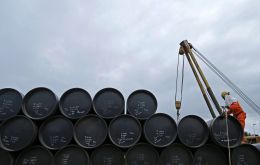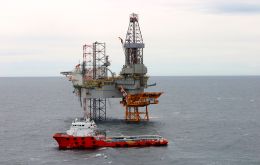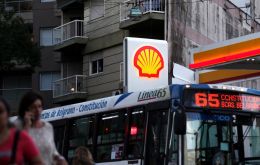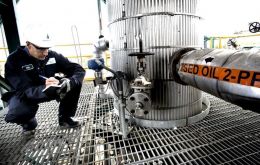MercoPress. South Atlantic News Agency
Tag: oil
-
Wednesday, May 30th 2018 - 08:35 UTC
Shipping emissions the greatest challenge to oil price hikes

The most prominent driver of oil prices over the next two years is not likely to come from OPEC, Iran or Venezuela, but rather in the shape of a shipping revolution, analysts have warned. New rules coming into force in approximately 18 months' time are seen as a source of great concern for some of the world's biggest oil producers.
-
Friday, May 18th 2018 - 08:24 UTC
Oil hits US$ 80, its highest level since 2014; London's FTSE on new all time-high

Benchmark oil contract Brent North Sea hit its highest level since late 2014 on Thursday, breaching US$ 80 per barrel, with some market players predicting it could rise all the way to US$ 100. Higher oil prices, in turn, pushed the shares of energy firms in European stock markets higher, helping London's FTSE to set a new all-time high, and the Paris CAC to establish a fresh 2018 peak.
-
Thursday, May 17th 2018 - 18:02 UTC
IEA: High Oil Prices “Taking A Toll” On Demand

Geopolitics has taken over the oil market, driving oil prices up to three-year highs. The inventory surplus has vanished, and more outages could push oil prices up even higher. Yet, there are some signs that demand is starting to take a hit as oil closes in on $80 per barrel.
-
Saturday, May 12th 2018 - 09:37 UTC
Leading global oil companies interested in Argentina offshore blocks auction

Oil firms, including Norway’s Statoil, U.S.’ Anadarko Petroleum Corp, China’s CNOOC and Malaysia’s Petronas, have shown interest in Argentina’s auction this year of offshore blocks for exploration and production, the country’s energy minister said.
-
Tuesday, May 8th 2018 - 08:14 UTC
Oil rises to US$ 70 a barrel, ahead of Trump's Tuesday decision on sanctions to Iran

Oil prices rose for the fourth straight day on Monday to hit levels not seen since late 2014, boosted by the latest trouble for Venezuelan oil company PDVSA and the possibility that the United States could re-impose sanctions on Iran.
-
Wednesday, April 25th 2018 - 08:59 UTC
Brazilian company buys Shell downstream assets in Argentina

Brazil’s Raizen Combustiveis SA agreed to buy downstream assets in Argentina from Royal Dutch Shell for US$ 950 million, according to a securities filing on Tuesday. Raízen Combustiveis, a joint venture between Brazil´s Cosan SA Indústria e Comércio and Shell, will have a 20% market share in fuel distribution in Argentina.
-
Thursday, April 5th 2018 - 09:29 UTC
Falklands included in Italy's Edison divesting of its oil and gas unit

Italian energy group Edison, part of French utility EDF, is preparing the sale of its oil and gas unit, the latest power producer to abandon fossil fuels to focus on its retail business, four industry sources said, and quoted by Reuters. Its oil and gas unit includes interests in the Falkland Islands.
-
Sunday, February 25th 2018 - 13:48 UTC
Why The Next Oil Boom Will Be Fueled By Blockchain

Big Oil is due for a disruption.
-
Wednesday, February 21st 2018 - 01:26 UTC
Petro, the Venezuelan cryptocurrency is online

The pre-sale of Petro began early on Tuesday, the cryptocurrency proposed by the Venezuelan government in recent weeks and backed by the country's natural resources. According to experts, it is “ridiculous”, arguing that the creation of a new currency would aggravate the economic crisis in the Caribbean country.
-
Monday, February 5th 2018 - 09:08 UTC
Can The Shale Boom Avoid These Bottlenecks?

By Nick Cunningham of Oilprice.com <br />
<br />
Shale companies continue to drill at a frenzied pace, adding rigs and breaking U.S. oil production levels with each passing week. Yet, the oil production is becoming increasingly geographically concentrated. Not only is the Permian basin accounting for much of the new oil production in the U.S., but a relatively small number of counties within the Permian are home to most of that action.
